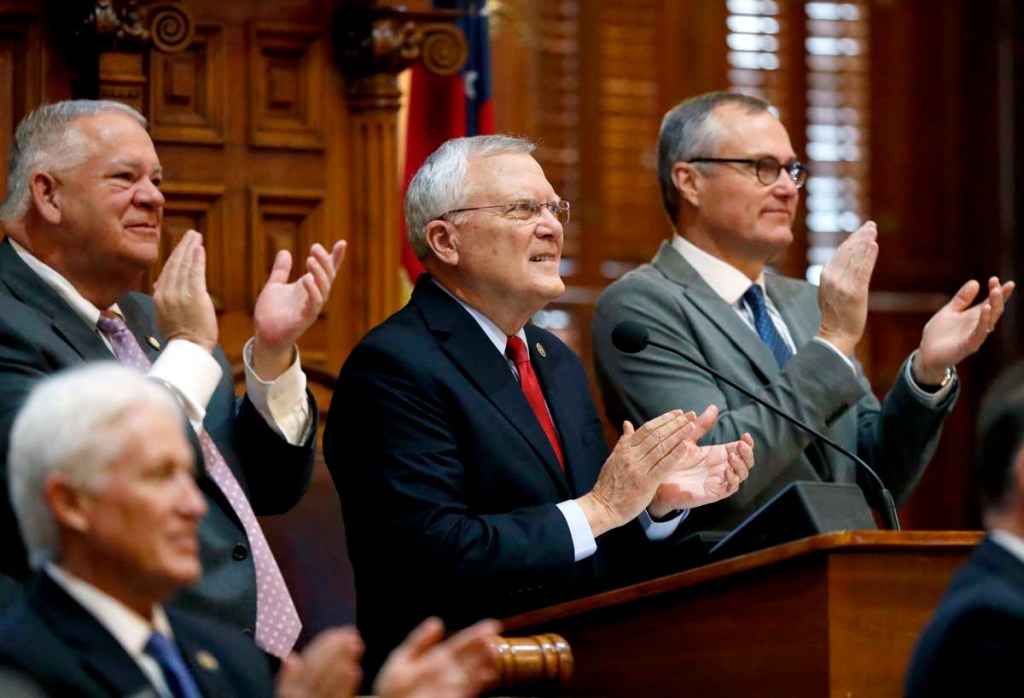Gov. Deal delivers his final state-of-the-state speech
Published 9:27 pm Thursday, January 11, 2018

- Georgia Gov. Nathan Deal, center, applauds as he acknowledges his wife, Sandra Deal, sitting up in the balcony while delivering the State of the State address at the state Capitol in Atlanta, Thursday, Jan. 11, 2018. (AP Photo/David Goldman)
ATLANTA – Term-limited Gov. Nathan Deal focused on fortifying his administration’s existing initiatives during an emotional, reflective state-of-the-state address.
There were no sweeping new plans announced for his final year in office. No ambitious endeavors, such as the school turnaround efforts from years past. No dramatic salary hikes, such as the 20 percent pay raise for state law enforcement doled out last year.
Rather, Deal used the spotlight to highlight the progress made in the last seven years and the energy he said he intends to channel toward strengthening key initiatives, such as criminal justice reform.
“We have much work to do during this legislative session. I want you to know that I will work vigorously with you to continue to polish the apples that we are harvesting from our orchards of opportunity,” Deal said, leaning on a cultivation theme used in his speech.
Deal, who first took office in 2011, choked up several times as he spoke Thursday, particularly when reflecting on the first lady, Sandra Deal, and his four decades of public service.
Also on Thursday, the governor unveiled his proposed $26 billion budget for next year, as well as his amended budget for the current fiscal year. Lawmakers will spend the next few weeks combing through the numbers, with agency hearings starting next week.
Nearly $23 million is proposed for children’s mental health, with a big chunk of it going toward crisis services. About $1.1 million will go toward suicide prevention.
Nearly $800,000 is planned for children’s opioid prevention and intervention. Elsewhere, $5 million was added to continue to grow the state’s accountability courts, which offers those struggling with addiction a chance to avoid prison.
Deal’s chief of staff, Chris Riley, indicated the governor may be open to adding more funding. The governor’s office would continue to work with both chambers to identify “best practices” for combating the crisis, he said.
“We don’t necessarily have the best answer there and so, therefore, we want to work with the General Assembly in terms of that,” Riley said during a budget briefing with reporters. “So at this point you won’t see a large chunk of money there.”
There are also no pay raises in the proposed budget for teachers or state workers, and Deal gave no indication that he was in any mood to try to take on large-scale health care changes.
“He really didn’t address the need of Georgia to promote the health of Georgia citizens,” said Senate Minority Leader Steve Henson, D-Stone Mountain.
“We really haven’t addressed, not only trauma care, but indigent care. No discussion of Medicaid expansion or trying to seek waivers for any additional funding from the feds,” Henson added. “So that was very disappointing that we didn’t hear something substantive on that.”
Sid Chapman, president of Georgia Association of Educators, said he appreciated Deal’s emphasis on technical education and the steps made to preserve the HOPE scholarship and grant program.
But a pay raise for educators was noticeably absent in his speech, he said.
“We’d like for him to pay more attention to the practitioners as we get along through the year and the needs in the classrooms and of those who are on the front lines,” Chapman said.
The budget does, however, include a whopping $361.7 million to keep the teacher’s retirement system from going bankrupt, said Riley.
“That’s one of the biggest – if not the biggest – cash allocations (in next year’s budget),” Riley said.
The budget also does not factor in the possibility of Congress failing to extend two federal programs that provide health care to children and funding to rural hospitals.
“We fully expect the congressional delegation to fulfill the federal government’s obligation,” Riley said, adding that the state is also still analyzing the potential impact of the federal tax bill that passed last month.
Also in his speech, Deal touted a plan to add $1 million for a campaign promoting the state’s technical colleges, as well as another $1 million to purchase two mobile labs for the technical college system’s welding program.
This was in addition to announcements Deal made in a speech earlier in the week, including a plan to add $25 million to the current budget for upgrades at rural airports so they can accommodate corporate jets carrying potential job creators.





